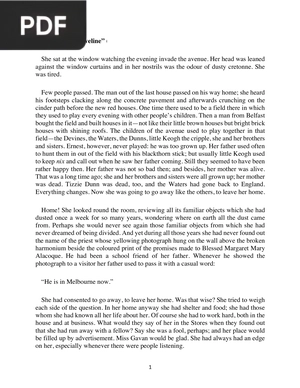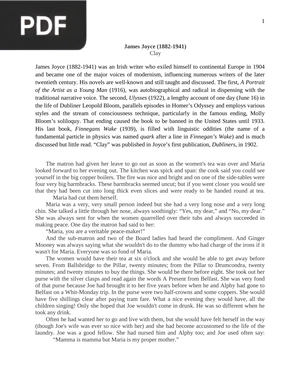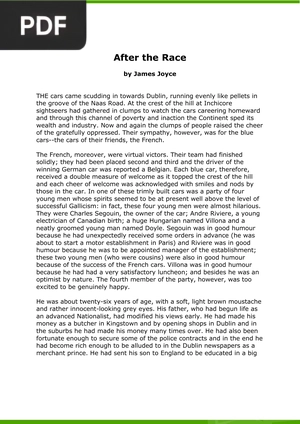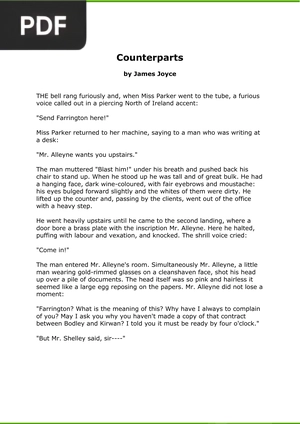Araby
Author: James Joyce
*Wait a few seconds for the document to load, the time may vary depending on your internet connection. If you prefer, you can download the file by clicking on the link below.
Information
Description: <p><strong>Araby</strong> is a short story published in the 1914 Dubliners collection. At the beginning the narrator of the story tells us about the life of the inhabitants of North Richmond Street, and then moves on to the story of his crush on his friend Mangan's sister.</p> <p>It also touches on other themes such as coming of age, the clash of imagination with reality, the consequences of idealization, the influence of the Catholic Church so that desire and sensuality are considered immoral, and so on.</p> <p>The young man cannot wait to go to the Araby bazaar and to procure for his beloved some gift that will make her feel affection. This story presents us with a circular journey, in which the protagonist decides to return to the place where he started his journey, having an unsuccessful outcome.</p>
Pages: 5
Megabytes: 0.01 MB
This may interest you
Eveline
Extension: PDF | 4 pages
<p>It is a short story first published in 1904 by the Irish Homestead magazine. It tells the story of <strong>Eveline</strong>, a 19-year-old girl who plans to leave Dublin for Buenos Aires with her lover, a sailor named Frank.</p> <p>Our young protagonist evaluates different aspects of her life before leaving to meet her lover: she has little loyalty for her job as a saleswoman, before her mother died she promised her to take care of the house, one of her brothers has also died and the other one is on the road, besides she fears that her father will beat her as he used to do with her brothers.</p> <p>Finally being at the dock where she and Frank are about to embark Eveline makes the painful decision to not travel with him, as she feels deeply conflicted.</p>
Clay
Extension: PDF | 5 pages
<p><strong>Clay</strong> is a short story published in the 1914 Dubliners collection. It deals with the reflections of Maria, an elderly single woman during the course of her day.</p> <p>The old woman is on her way to spend a night's vacation at the home of Joe, a man she cared for as a child and is still very fond of. When she arrives at Joe's house, she is warmly welcomed.</p> <p>She sets out to play a game with the children in which objects (with supposed prophetic significance) are placed in saucers and a blindfolded player has to choose between them. The old woman does not choose the ring - representing marriage - and instead chooses a lump of clay, is allowed to choose again and picks up the prayer book, indicating a life of spiritual vocation.</p>
After the Race
Extension: PDF | 6 pages
<p>In <strong>After the Race</strong>, the protagonist Jimmy Doyle travels to Dublin with his wealthy friend Charles Ségouin; André Rivière, Ségouin's cousin; and Villona, a Hungarian pianist. Back in Dublin, Jimmy enjoys the notoriety of being surrounded and seen with such glamorous company and in a very luxurious car.</p> <p>Later, while dining, they are joined by an Englishman, Routh, and engage in a conversation about politics. Jimmy, speaking of Irish-English relations, provokes an angry response from the Englishman, but Ségouin deflects his attention with a toast.</p> <p>Later, an American named Farley invites them to his yacht. Jimmy, very drunk, plays game after game of cards, losing more and more money, with Routh as the winner. Which can be seen as a way for our protagonist to try to enter cosmopolitan society and make a place for himself on equal terms, but he ends up failing.</p>
Counterparts
Extension: PDF | 11 pages
<p><strong>Counterparts</strong>, is a short story that introduces us to a night in the life of Farrington, an alcoholic scrivener who is unsuccessful in his professional life. While at work his boss, Mr. Alleyne, reprimands him for not finishing a job, as Farrington instead of getting to it immediately, sneaks out of the office for a glass of beer.</p> <p>Subsequently, his boss reprimands him again, to which Farrington responds with a flippant comment and has to apologize. After work, Farrington pawns his watch chain for money and goes drinking with his friends.</p> <p>Upon returning home he tells his youngest son to cook dinner, but when the boy lets the kitchen fire go out, the man’s rage explodes and he begins beating the kid with a cane. The title may be due to the fact that Farrington is seen to be the counterpart of his boss, as he (Farrington) abuses his son just as Mr. Alleyne abuses him in the office.</p>
Pomes Penyeach
Extension: PDF | 18 pages
<p><strong>Pomes Penyeach</strong> is a collection of short poems that was written over 20 years, from 1904 to 1924, and first published in 1927. Some of the poems continue to appear in anthologies to this day, such as: A Flower Given to My Daughter, On the Beach at Fontana, Tilly and Bahnhofstrasse. Other poems included are: She Weeps over Rahoon, Nightpiece, A Memory of the Players in a Mirror at Midnight.</p> <p>It is worth mentioning that this collection contains several Joycean neologisms (moongrey, for example) created by merging two words into a new compound. It is also important to note that the word love appears thirteen times, which is equivalent to the number of poems included in this collection.</p> <p>Among the verses we can find references to romantic love, ranging from sentimentality or nostalgia, to scathing, also achieving a sense of vitality and loving compassion.</p>











































